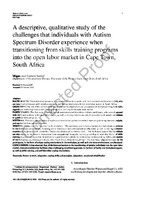| dc.identifier.citation | Soeker, Mogammad Shaheed. “A Descriptive, Qualitative Study of the Challenges That Individuals with Autism Spectrum Disorder Experience When Transitioning from Skills Training Programs into the Open Labor Market in Cape Town, South Africa.” Work (Reading, Mass.), vol. 65, no. 4, IOS Press BV, 2020, pp. 733–47, doi:10.3233/WOR-203127. | en_US |
| dc.description.abstract | BACKGROUND: There is limited existence of qualitative research on adults with Autism Spectrum Disorder (ASD), who are transitioning between skills training programs and finding employment in the open labor market, in South Africa. OBJECTIVE: The aim of this current study was to explore the experiences and perceptions of individuals living with ASD, regarding transitioning from a skills training program to working in the open labor market. PARTICIPANTS: The data were collected through semi-structured interviews with ten participants, who were diagnosed with ASD, and working in the open labor market, as well as five key informants, who have worked with autistic individuals in a skills training program. METHODS: The data collected, using an explorative, descriptive, qualitative method, were analyzed using thematic analysis, and resulted in three emerging themes. RESULTS: Theme one: The 'disorder' in the workplace -The individual and collective barriers that individuals experience in the workplace are described, including social, emotional, and communication difficulties, as well as the stigmatization experienced by persons with a disability. Theme two: Making the workplace work -The facilitative support that individuals are exposed to, in the form of intervention from occupational therapists, sensory psychologists, and other forms of skills training programs, are described. In addition to supportive intervention, the relationships and networking within, and outside of the workplace, are discussed in theme two. Theme three: What works for me -The individual adaptations made by the participants, in the form of unique coping mechanisms in the workplace, as well as in the home environment, are discussed. CONCLUSION: It was observed that, while there are barriers to the transitioning of autistic individuals into the open labor market, there are enablers that facilitate a less challenging transitioning process, in the form of family and workplace support, as well as skills training, and self-identified coping mechanisms. © 2020 - IOS Press and the authors. All rights reserved. | en_US |

